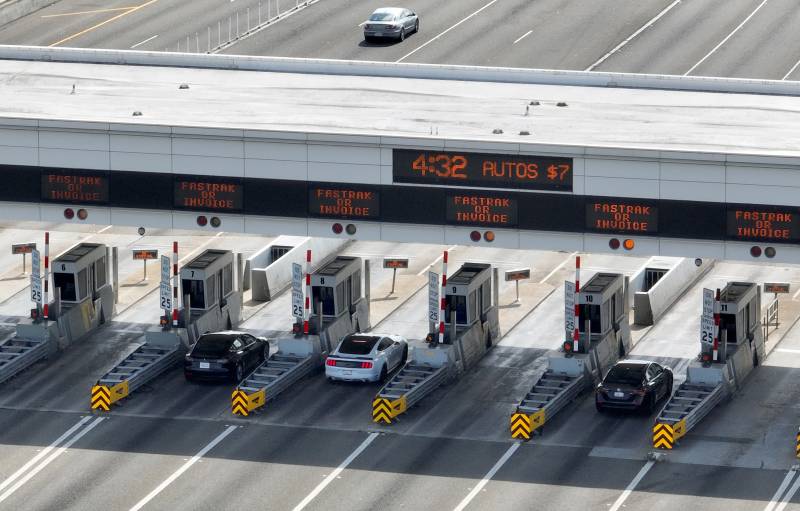Update, Monday, Aug. 21: State Sen. Scott Wiener (D-San Francisco) announced early Monday he’s “pausing” SB 532, a proposal to impose a $1.50 bridge toll increase to support Bay Area transit agencies facing a fiscal crisis because of pandemic-related ridership losses.
The bill, which would have required a two-thirds majority to pass both houses of the state Legislature, caused a split in the Bay Area’s Assembly and Senate delegations. Seven members joined Wiener as co-authors while half a dozen lawmakers from the region said they opposed the toll increase.
“We’ve been trying to build more consensus within our Bay Area legislative delegation, and it became apparent last week that we did not have enough time to do the consensus building that we needed to do for this bill to be able to pass before the end of session,” Wiener told KQED in an interview Monday.
Wiener said he’ll work with Assemblymember Lori Wilson (D-Suisun City), one of the bill’s opponents, to consider new transit-funding proposals to help Bay Area transit agencies avoid service cuts.
“Assemblymember Wilson and I have committed to each other that we will co-facilitate a process over the fall recess to try to come up with a solution,” Wiener said. “And the fact that I’m the author of this bill and she was a skeptic of the bill, that’s a powerful combination and she’s a very constructive partner. And I’m optimistic we’ll be able to get something done.”
Wilson said in a Monday interview that she recognizes the magnitude of the fiscal crisis facing transit agencies. But she said she opposed the toll increase because of its impact on drivers in her district — which includes Solano County and far eastern Contra Costa County — and because it would deliver little direct benefit to transit agencies there.
Typically, she said, a portion of tolls collected from drivers in a given county is reinvested in that county to support its public transit and other transportation needs. But that wouldn’t have been the case with SB 532.
“With this particular toll, it is need-based, and so it is going to those [transit agencies] that have the highest need currently,” Wilson said. “That’s BART, Muni and AC Transit.”
She said that would mean that residents who currently drive because there are few robust public transit options in their communities would be put in the position of subsidizing agencies to which they have little access.
“So I struggled with that quite a deal,” Wilson said, especially when tolls are already scheduled to increase from $7 to $8 per crossing in January 2025. The toll to help transit would have raised the fee to $9.50 through the end of 2028.
In a statement, Muni spokesperson Erica Kato said the withdrawal of SB 532 was “very disappointing, and it’s a blow to our efforts to maintain Muni service after federal pandemic relief funds run out next year. But we’re going to keep fighting for the hundreds of thousands of people who rely on Muni every single day.”
BART, whose elected board voted to support SB 532 in June, said it anticipates being involved in further discussions with Sen. Wiener and other legislators on funding ideas. Many who opposed the proposed toll increase were critical of the measure because it did not come along with formal guarantees that BART would improve its performance on public safety, cleanliness and fiscal accountability.
“BART will continue to work with legislators on accountability measures in the future,” a BART spokesperson said in an email. “BART staff will continue to offer our assistance to the Senator and other lawmakers as they work to find a consensus solution to this regional issue.”
BART board member Debora Allen, who represents central Contra Costa County, had voted against supporting SB 532. She said the agency and the Legislature need to focus on long-term measures that address not only revenue needs but also deficits that will exceed $300 million a year after 2025.
“I think SB 532 was the wrong approach for funding BART, and I am glad to see it being placed on hold because I think the Legislature and BART need to come together with a comprehensive plan for both funding and reducing spending,” she said.
The Bay Area Council, which has called on BART to make urgent improvements to passenger safety and overall customer experience, also applauded Wiener’s suspension of SB 532.
“We need our transit operators to make the necessary structural changes to bring their operations and budgets in line with both today’s fiscal realities and the tectonic changes that decimated ridership and have kept riders away from our transit systems, including addressing crime, safety and cleanliness,” Jim Wunderman, the council’s president and CEO, said in a statement. “We can’t continue to fund unsustainable transit operations that aren’t meeting the needs of riders for a safe, convenient and seamless commute.”
Original story, Saturday, Aug. 19: Bridge Toll Increase Would Help Transit. How Much Would It Hurt Drivers?
A bill that would impose a $1.50 toll increase on Bay Area bridges to provide emergency funding for BART, Muni and other transit operators has sparked a debate over whether the added charge will fall disproportionately on lower-income commuters already struggling with the region’s high cost of living.
That issue was at the top of a list of concerns raised in a letter last month from seven Bay Area members of Congress (PDF), led by Rep. Mark De Saulnier (D-Walnut Creek), that urged Gov. Gavin Newsom and state legislative leaders to oppose the bill. The Bay Area Council, a group counting 300 businesses and institutions as members, has also expressed similar displeasure with the toll increase bill, SB 532, by state Sen. Scott Wiener (D-San Francisco).
“Many employees now have the advantage to do their work from home,” the letter concluded. “There are others, the working people of the Bay Area, that don’t share this advantage, and the proposed toll hike comes straight out of their wallets.”
